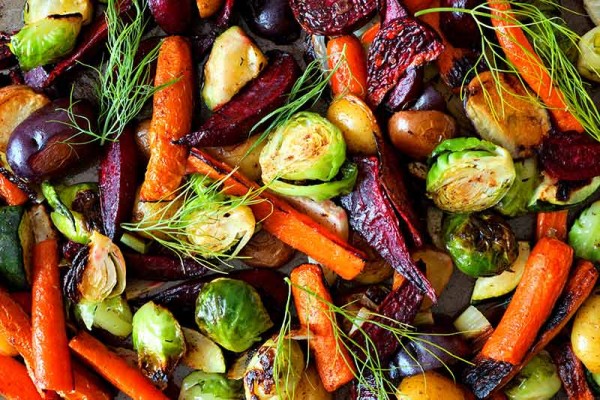In summer it seems to be especially easy for us to eat healthy food. Fresh strawberries, juicy melons, crisp salads, aromatic cucumbers and tomatoes make for a varied diet. In winter, on the other hand, things look cloudy. Or does it? We are sure: Winter vegetables are better than their reputation. They are healthy, tasty, ecologically sound and anything but boring. We show you 5 good reasons why winter vegetables now belong on every table.
Winter vegetables are seasonal and (often) regional
Winter vegetables include vegetables harvested in late autumn or winter, such as turnips, cabbage, pumpkin and fennel. Many of these vegetables can even be stored for several weeks or months. This means they are available until the end of the winter.
Winter vegetables in particular often only have a short way to go before they are put on the market. You can often find local goods here. A look at the label is worthwhile. The country of origin must be noted on it, this is required by law. It is good if the vegetables come from your country - even better if they come from the region, i.e. a radius of about 100 kilometres. To be on the safe side, you can buy local vegetables fresh from the field directly from the producer in the farm shop.
Winter vegetables are full of vital substances and vitamins
Nature gives us winter vegetables rich in vitamins, with which we are well prepared for the cold season. The vital substances, vitamins, secondary plant substances and minerals they contain support the immune system in winter. This is because seasonal (and therefore at best domestic) vegetables have a particularly high nutrient content - because they are allowed to ripen completely.
Cabbage is a typical winter vegetable. It is full of nutrients and vital substances, but at the same time very low in calories. The kale is particularly worth mentioning. It is a valuable superfood with vitamin A, vitamin C, vitamin K, folic acid, calcium, potassium, magnesium, iron, omega-3 fatty acids, fibre and secondary plant substances. The winter vegetable fennel is only in season in October and November and is rich in all B vitamins (except B12), vitamin C, vitamin E, potassium, calcium, iron and beta-carotene. You can buy mushrooms all winter long. They are rich in minerals, protein, B vitamins and the sun vitamin D, which is so important in winter.
Of course you can also buy cucumbers, tomatoes, asparagus and snow peas in the supermarket in winter. But actually these vegetables only thrive in summer, not in winter. That is why they are transported to us from other countries by ship, plane or truck over long distances. Unfortunately, you can also taste this: many vegetables are watery and not very aromatic. In addition, they are often heavily contaminated with pollutants, pesticides and nitrate. winter vegetables are low in pollutants
Domestic winter vegetables grown outdoors usually contain few pesticides. If possible, choose regional, seasonal and organic vegetables. These are significantly healthier and of better quality than imported summer vegetables in winter.
Winter vegetables are good for the environment
Regionally grown winter vegetables directly from the field have a good ecological balance. Because it does not need to be grown under glass in heated greenhouses, no foil tunnels and no long transports that require a lot of energy in the form of CO2.
But not all winter vegetables are the same: how they are grown makes a big difference. One kilogram of lettuce grown in the field produces 140 grams of CO2. In contrast, a lettuce grown under glass produces 30 times as much. By the way: local, seasonal vegetables are often inexpensive - because transport costs are lower or even completely eliminated.
Winter vegetables taste good
Winter vegetables of the season simply taste better. If parsnips, kale and the like are allowed to ripen fully under the open sky, they have an intense taste and can enrich more nutrients. Directly after harvesting, they land fresh and crisp on the market.
The situation is completely different with imported goods: the fruits are still unripe when harvested so that they can survive the long journey to us. Taste does not develop at all. And unfortunately, many vitamins and vital substances are also lost during transport.
What winter vegetables are there?
These winter vegetable varieties are available fresh or stored from domestic cultivation:
- Butter beets (also known as swedes) - fresh and stored
- Mushrooms - fresh
- Fennel - October and November
- Kale - fresh
- Potatoes - fresh and predominantly stored
- Pumpkin - fresh and mainly stored
- Leek/leek - fresh
- Chestnuts - September to December
- Carrots - fresh and mainly stored
- Parsnips - fresh
- Parsley roots
- Radicchio - October
- Brussels sprouts - fresh
- Beetroot - fresh and partly stored
- Red cabbage - fresh and partly stored
- Black salsifies - fresh
- Turnips - fresh and partially stored
- Jerusalem artichoke - fresh
- White cabbage - fresh and partly stored
- Savoy cabbage - fresh
- Onions - stored
This might also interest you
-
Vitamin D deficiency: this is how important the special vitamin is
80% of the population suffer from a vitamin D deficiency - especially in winter. Learn all about the causes, symptoms and treatment of vitamin D deficiency. -
How to survive the autumn well: Vital substances for your immune system
Everywhere harmful viruses and bacteria lurk, just waiting to enter our bodies. So you can strengthen your defences.
Picture: istockphoto | jenifoto, istockphoto | Martinan, istockphoto | firina











